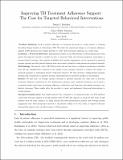| dc.contributor.author | Boutilier, Justin J | |
| dc.contributor.author | Jónasson, Jónas Oddur | |
| dc.contributor.author | Yoeli, Erez | |
| dc.date.accessioned | 2022-09-14T14:59:18Z | |
| dc.date.available | 2022-09-14T14:59:18Z | |
| dc.date.issued | 2021 | |
| dc.identifier.uri | https://hdl.handle.net/1721.1/145407 | |
| dc.description.abstract | <jats:p> Problem definition: Lack of patient adherence to treatment protocols is a main barrier to reducing the global disease burden of tuberculosis (TB). We study the operational design of a treatment adherence support (TAS) platform that requires patients to verify their treatment adherence on a daily basis. Academic/practical relevance: Experimental results on the effectiveness of TAS programs have been mixed; and rigorous research is needed on how to structure these motivational programs, particularly in resource-limited settings. Our analysis establishes that patient engagement can be increased by personal sponsor outreach and that patient behavior data can be used to identify at-risk patients for targeted outreach. Methodology: We partner with a TB TAS provider and use data from a completed randomized controlled trial. We use administrative variation in the timing of peer sponsor outreach to evaluate the impact of personal messages on subsequent patient verification behavior. We then develop a rolling-horizon machine learning (ML) framework to generate dynamic risk predictions for patients enrolled on the platform. Results: We find that, on average, sponsor outreach to patients increases the odds ratio of next-day treatment adherence verification by 35%. Furthermore, patients’ prior verification behavior can be used to accurately predict short-term (treatment adherence verification) and long-term (successful treatment completion) outcomes. These results allow the provider to target and implement behavioral interventions to at-risk patients. Managerial implications: Our results indicate that, compared with a benchmark policy, the TAS platform could reach the same number of at-risk patients with 6%–40% less capacity, or reach 2%–20% more at-risk patients with the same capacity, by using various ML-based prioritization policies that leverage patient engagement data. Personal sponsor outreach to all patients is likely to be very costly, so targeted TAS may substantially improve the cost-effectiveness of TAS programs. </jats:p> | en_US |
| dc.language.iso | en | |
| dc.publisher | Institute for Operations Research and the Management Sciences (INFORMS) | en_US |
| dc.relation.isversionof | 10.1287/MSOM.2021.1046 | en_US |
| dc.rights | Creative Commons Attribution-Noncommercial-Share Alike | en_US |
| dc.rights.uri | http://creativecommons.org/licenses/by-nc-sa/4.0/ | en_US |
| dc.source | Prof. Jonasson | en_US |
| dc.title | Improving Tuberculosis Treatment Adherence Support: The Case for Targeted Behavioral Interventions | en_US |
| dc.type | Article | en_US |
| dc.identifier.citation | Boutilier, Justin J, Jónasson, Jónas Oddur and Yoeli, Erez. 2021. "Improving Tuberculosis Treatment Adherence Support: The Case for Targeted Behavioral Interventions." Manufacturing and Service Operations Management. | |
| dc.contributor.department | Sloan School of Management | en_US |
| dc.relation.journal | Manufacturing and Service Operations Management | en_US |
| dc.eprint.version | Author's final manuscript | en_US |
| dc.type.uri | http://purl.org/eprint/type/JournalArticle | en_US |
| eprint.status | http://purl.org/eprint/status/PeerReviewed | en_US |
| dc.date.updated | 2022-09-14T14:54:15Z | |
| dspace.orderedauthors | Boutilier, JJ; Jónasson, JO; Yoeli, E | en_US |
| dspace.date.submission | 2022-09-14T14:54:17Z | |
| mit.license | OPEN_ACCESS_POLICY | |
| mit.metadata.status | Authority Work and Publication Information Needed | en_US |
